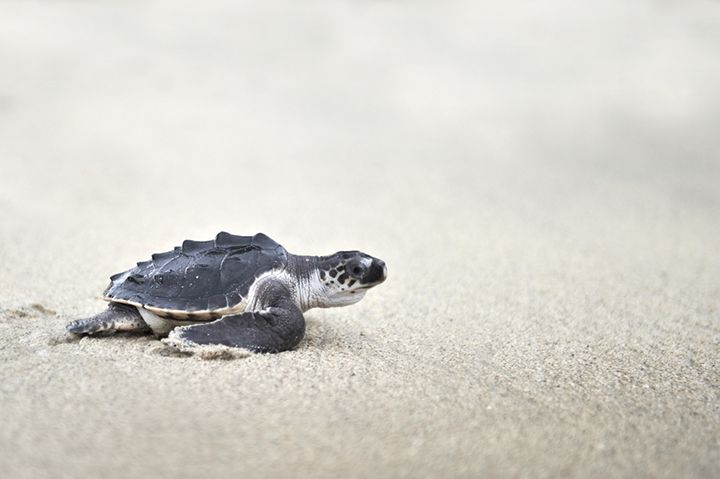Olive Ridley Turtles is on the Vulnerable list on the WWF scale of Extinction Risk and this is because of the way they nest. Olive Ridley females nest in very few places the world over, which in turn means that the disruption of even one or two nesting sites causes a huge risk for the population of these olive-colour-shelled turtles. Wildlife conservation has finally started garnering some attention from mainstream media, but not even close to the amount it warrants.
As with all life cycles and other things in nature, every little thing is interconnected. In the same way, all stages of the Olive Ridley turtle’s life are affected by environmental conditions. For example, the warmer the nesting beach is, the higher the chances that more females are hatched. Hence, it can be assumed that with higher water temperatures and global warming created issues, there are arguably more female than male hatchlings, which also affects the population numbers. Finally, storm conditions, rising sea levels and pollution and waste destroy critical nesting beaches and damage nests.
This is why it’s all the more amazing that after 20 years, Olive Ridley turtles have found their way back to the once garbage-infested Versova beach in Mumbai. This can be connected to the efforts of Afroz Shah, lawyer and environmental activist, who started cleaning up Versova beach in 2015 and kept the effort going for 109 weeks cleaning tonnes of plastic.
Yesterday, some beach clean-up volunteers who were on the beach spotted 80 hatchlings coming out of the eggs and scurrying into the sea. They called forest department marine officials who ensured that the hatchlings reached the sea safely.
Afroz tweeted this soon after:
Week 127 .
Fantastic news for Mumbai .
We got back Olive Ridley Sea Turtle after 20 years. Historic moment
Nested and Hatched at our beach. We facilitate their journey to ocean.
Constant cleaning helps marine species.
Marine conservation centre needed at @versovabeach pic.twitter.com/j79xCKamNh
— Afroz Shah (@AfrozShah1) March 22, 2018
According to officials, these turtles usually nest in places they feel secure and it’s also a possibility that the adult females came back to nest where they hatched. And this particular species has been found to have nesting sites in few areas on the coast of Orissa, Maharashtra, Goa in India and internationally in Sri Lanka, Mexico and Costa Rica.
In the wake of the news about Sudan, the last white rhinoceros, earlier this week, at least this seems like a little bit of good news.
Don’t forget to follow @missmalinilifestyle to never miss a beat!

